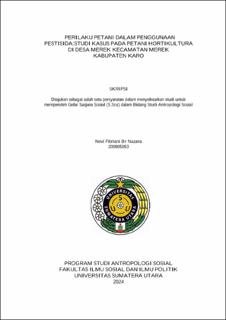| dc.description.abstract | The use of pesticides is often accused of being solely for the benefit of farmers and endangering consumers. However, delving into this situation from the human perspective of farmers and sellers, and examining the widespread use of pesticides from a new perspective, remains important. This research scrutinizes the use of pesticides in agricultural land using the concept of structural violence as a theoretical scalpel. Structural violence is a concept that is rarely employed in understanding the cycle of pesticide use in the lives of farmers, sellers, and government authorities.
This research employed a qualitative approach with data collection techniques including in-depth interviews with 6 farmers, Focus Group Discussions (FGD) involving 7 participants, and observations in agricultural land. Additionally, pesticide sellers and District Department of Agriculture Office staff were interviewed. Unfortunately, no information from health workers was collected in this study to shed light on farmers' health due to pesticide use.The research is located in the Merek village, Merek District, Karo, North Sumatra. Data obtained were analyzed using thematic analysis with manual coding techniques.
Three main themes emerged from the data. The use of pesticides, in accordance with the perceptions of informants, disregarding its impact on farmers' health even without personal protective equipment. Field practices indicate that farmers assume disturbances to their land and production can only be "cured" or managed through pesticides. In its context, there is unrestricted sales, even incentivized, of pesticides. Despite the expensive price of pesticides, farmers still use them. Structural violence explains that although the vision of farming is used as a target, it turns out to be merely a slogan, as implementation in the field neglects the interests, health, and protection of farmers.
The use of pesticides and the distribution of their sales in the Karo Regency especially in the research location indicate a structural policy that disregards the needs of farmers. They are left in a precarious situation due to the impacts of these pesticides.
Policy improvements in agricultural land are necessary to change this long-standing condition. | en_US |


